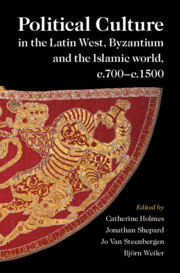 Political Culture in the Latin West, Byzantium and the Islamic World, c.700–c.1500
Political Culture in the Latin West, Byzantium and the Islamic World, c.700–c.1500 Nomads, Urban Elites and Courts in Competition
from Part IV - Practice and Organisation
Published online by Cambridge University Press: 11 August 2021
The early Islamic empire may have been the largest by land, but military reach should not be mistaken for highly centralised administrative structures: these only developed as the empire fragmented but were replicated in the tenth-century successor states, where the position of vizier gained increasing political influence. Nor should imperial success be mistaken for a stable elite, as newcomers – notably court scribes and religious scholars – challenged the military. The Abbasid caliphs’ fortunes varied with their military, fiscal and administrative structures, but they remained necessary legitimisers of other political structures, too sacred to depose. However, it was the ʿulamaʾ who established and elaborated ideological structures that long outlasted the first Muslim empires. After the mid-thirteenth-century upheavals, the ad hoc reach of Turco-Mongol and Arabo-Berber trans-regional leaderships formed an ‘archipelago’ in a ‘sea of semi-independent regions’ characterised by violent, volatile and complex power relationships. Eventual stabilisation ended centuries of political turbulence, centred around the great early modern empires of the Ottomans, Safavids and Mughals.
To save this book to your Kindle, first ensure no-reply@cambridge.org is added to your Approved Personal Document E-mail List under your Personal Document Settings on the Manage Your Content and Devices page of your Amazon account. Then enter the ‘name’ part of your Kindle email address below. Find out more about saving to your Kindle.
Note you can select to save to either the @free.kindle.com or @kindle.com variations. ‘@free.kindle.com’ emails are free but can only be saved to your device when it is connected to wi-fi. ‘@kindle.com’ emails can be delivered even when you are not connected to wi-fi, but note that service fees apply.
Find out more about the Kindle Personal Document Service.
To save content items to your account, please confirm that you agree to abide by our usage policies. If this is the first time you use this feature, you will be asked to authorise Cambridge Core to connect with your account. Find out more about saving content to Dropbox.
To save content items to your account, please confirm that you agree to abide by our usage policies. If this is the first time you use this feature, you will be asked to authorise Cambridge Core to connect with your account. Find out more about saving content to Google Drive.